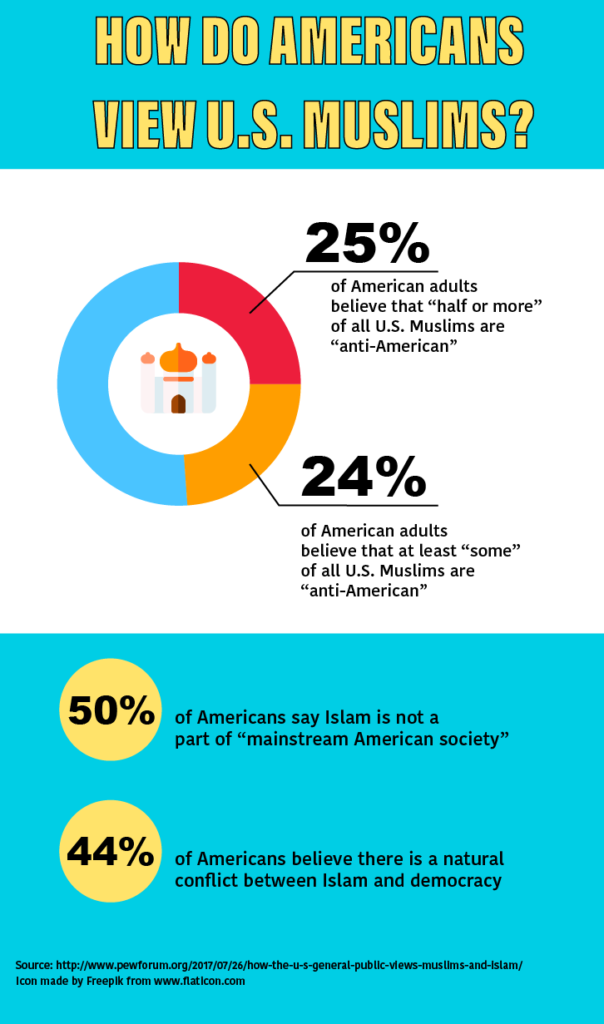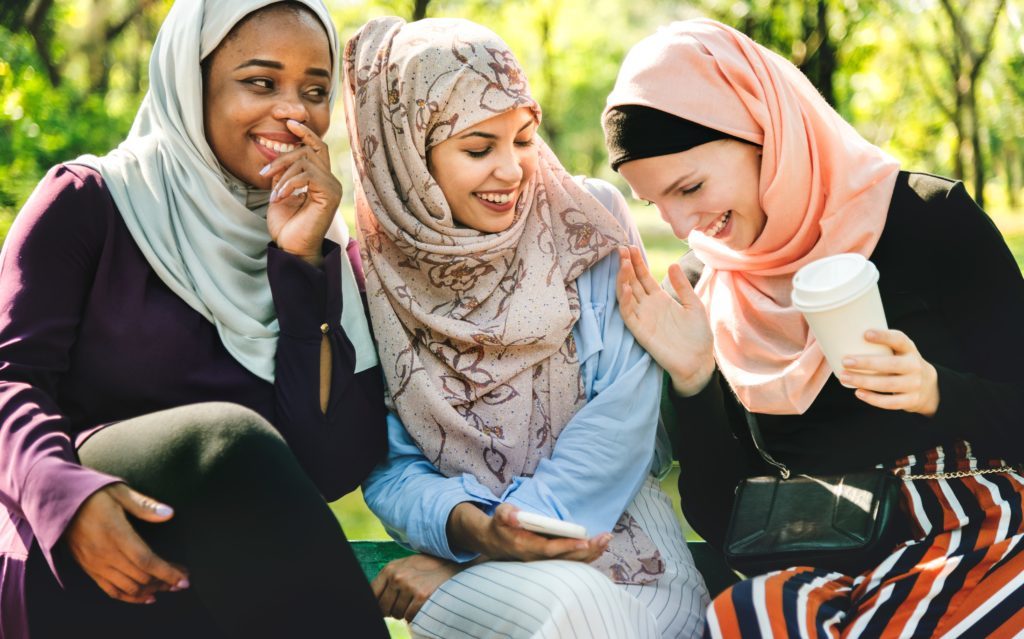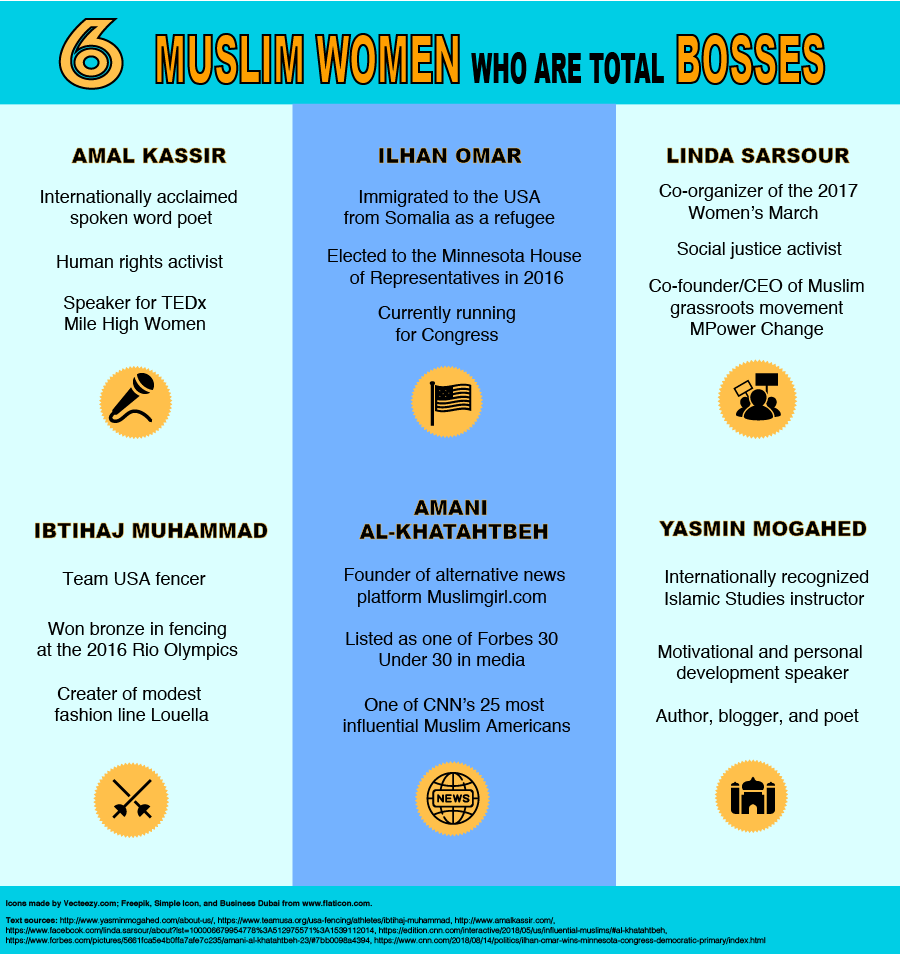What’s that on your head?
Veiled women get a bad rep.
The vast majority of Muslim women who do wear the headscarf – known in Arabic as the hijab – are not, in fact, oppressed. Yet few people realize this, because mass media often portrays an opposite version of a hijabi (i.e. hijab-wearing) woman’s reality.
In popular movies such as Iron Man 3, burqa-clad and hijab-wearing women are depicted as being in need of saving – especially by American men. In American Sniper, they’re shown as being savage terrorists. In news media, images from certain regions of the Middle East often highlight the cultural suppression women face, whether it’s demanded subservience, barriers from pursuing education and careers, or governmental restrictions on dress.
What’s often left out are the broadcasts that depict Muslim women as thoughtful people with their own agency, capable of making their own decisions about whether or not they cover. These women are not hard to find, either. They walk the streets of New York City, Chicago, Dallas, and San Francisco. They can be found in London, Amsterdam, Istanbul, Marrakech, Nairobi, Kuala Lumpur, Riyadh, and Cairo.
Their voices, however, are often overlooked or drowned out, and they are rarely portrayed in the mainstream media. The unfortunately reality is that when people who have never met a Muslim think “hijab,” they don’t think of an everyday Muslim woman, likely with a degree or a career. They think of the honor killings and the ISIS war brides of the world.

It’s little wonder, then, that when faced with all these stereotypes, wearing hijab in America isn’t exactly easy.
There’s the pressure to represent the entire faith tradition of 1.8 billion people. There’s the threat of attracting negative attention, including (but not limited to) being told to “get the [expletive] out of America,” being refused work because of company “look policies,” and even being physically assaulted.
Then, of course, there’s the rhetoric President Donald Trump often perpetuates about Muslims as a group. Besides saying things like “Islam hates us” and calling for a ban on Muslims entering the United States, Trump has also accused the hijab-wearing mother of a slain Muslim soldier of “not being ‘allowed’ to speak.”
Yet for many young women, including college students and young professionals, wearing hijab despite the current political climate is a chance to develop a sense of self – and to take pride in their Muslim identity.
Overcoming stereotypes
Muslim women are doctors, star athletes, entertainers, activists, businesswomen, politicians, fashion models, journalists, and more. Hijab isn’t an obstacle to reaching these goals, however. Often, as Sinthia Shabnam describes, it’s the negative attitudes hijabi women face from their own peers.
“Something I noticed when I first started wearing hijab in middle school [was that] people were always assuming I was going to be someone who was more passive in class… even though I didn’t have that personality the day before, when I wasn’t wearing hijab,” says Sinthia, a senior at North Carolina State University. She has in the past interned at the North Carolina General Assembly, the only hijab-wearing woman to do so in the summer of 2018.
“It’s a very instantaneous shift in how society begins to treat you,” she adds.
Debunking some myths

Possibly the first step towards ending this kind of judgmental treatment is through education. Below are some common myths about hijab, and how many Muslims address them.
Myth #1: Hijab is not a choice
The Quran (the Islamic holy scripture) addresses an individual’s right to choice in its second chapter, verse 256: “There is no compulsion in religion.”
In other words, religious beliefs or laws can’t be forced upon anyone.
Myth #2: Islam considers women to have a lower status than men
There is no textual basis for this in the Quran and the sayings of Muhammad. As an example, the Quran states that “I will not lose sight of any who labors in My Way, whether male or female – you are of one another.” Muhammad is also quoted as saying, “Women are the equal partners of men,” in a collection of his hadith (or narrations).
Myth #3: The majority of Muslim countries enforce hijab by law
The only country that enforces hijab at the national level is Iran. In countries such as Saudi Arabia and in certain areas of Afghanistan, Iraq, and Pakistan, hijab is enforced solely by societal pressures, and not religious decree.
In fact, there are more majority-Muslim countries that have banned either the face veil or the hijab. One example is Turkey, a country that only recently lifted its ban on hijabs in schools and other public areas. Another is Tunisia, where the hijab was frowned upon and banned from several public spaces up until the 2011 Arab Spring.According to religious cleric Okasha Kameny, there is no basis in Islamic law (also known as sharia) for a government imposing hijab on its citizens.
Myth #4: Hijabi women are held back from achieving their full potential
A hijab-wearing, Somali-American Muslim woman (and refugee to boot) can be elected to Congress in the age of Donald Trump. A hijab-wearing, Brooklyn-accented, Palestinian-American Muslim woman can be at the forefront of organizing the Women’s March. A hijab-wearing, TED Talk-giving, Egyptian-American Muslim woman can be a presidential advisor.
Achieving potential has little to do with whether or not there is a scarf on a woman’s head, and everything to do with her own hard work and determination.

Reclaiming the narrative
If Muslim women are perceived as being silent, it’s likely because people aren’t listening closely enough. There are plenty of hijabis who are vocal about their decision to cover up.
“Hijab is very empowering for me personally,” Sinthia Shabnam says, laughing, “because it always makes me stand out.”
“I [wear] it to defy the male gaze and force people to see me for my intellect and my abilities,” wrote Umema Aimen in a Washington Post article.
And there are others who are outspoken about the experience of being a hijabi Muslim woman.
“When all the public eye sees are headscarves instead of individual stories, our community is collectively tokenized,” writes Amani al-Khatatbeh, founder of the independent news platform MuslimGirl.com.
“I break the rules,” says Noor Tagouri, a journalist and documentary producer. “I allow myself to step out of my comfort zone and make people uncomfortable along the way”
“I’ve had to fight for every win, every place at the table, every ounce of respect on my path to world-class athlete,” says Ibtihaj Muhammad, Team USA fencer and Olympic bronze medalist. “And I will continue to fight because the prize this time — an America that truly respects all of its citizens — is worth more than any medal.”
“Inshallah,” she adds, using the Arabic phrase for ‘God Willing.’
“So, may it be.”
